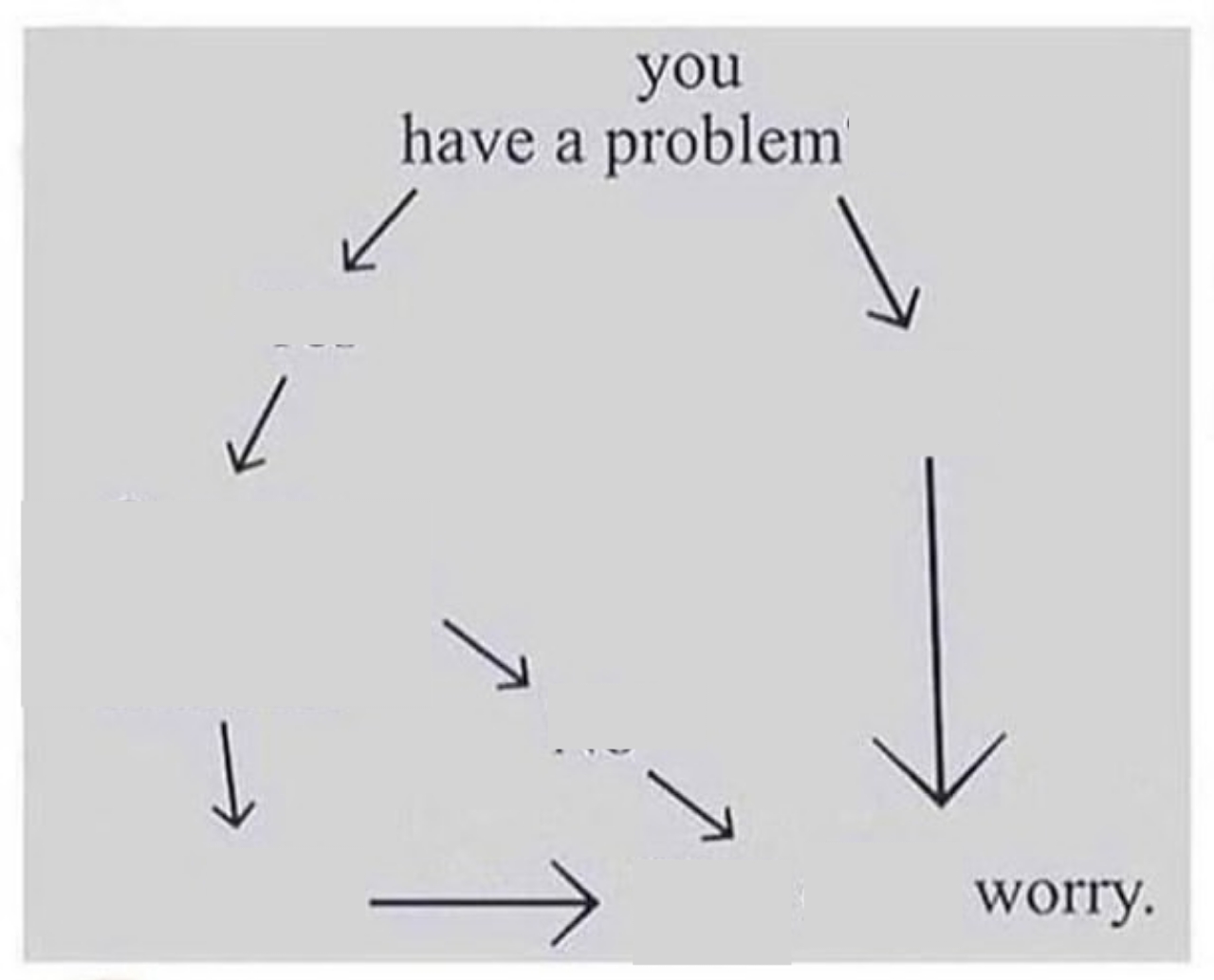This is mine.

Do you have a problem?
Yes
Can you do something about it?
I DONT KNOW
P A N I K
Do you have a problem? Yes, I don’t have enough money for bills + food.
Can you do something about it? No, I’m on a fixed income.
Then don’t worry. Uh…
I mean if a meteor is coming, I’m not worrying.
Yeah the usual mental worrying part is if you’re just not sure enough if the problem is actually in your reach or not.
Recontextualizing helps me a lot in these situations. So if I’m in your shoes I’d think: The new problem is that I don’t know if I can solve the original problem. Can I do something about that? Yes. Set aside time to focus on it, brainstorm, research, etc. If that comes up fruitful, I’ll do what I found, don’t worry. If it doesn’t, then there’s nothing to do, don’t worry.
You can set a point in the future to revisit and see if anything’s changed, based on how persistent this problem is in your life.
In practice this is easier said than done, of course. I fail to do it sometimes. But it’s a solid strategy that has helped me find a lot of peace. Give it a go!
I agree. Not sure that necessarily means we’re mentally stable.
Except for the Yes -> Then Don’t Worry part. If there is something that can be done then it should probably be done. Which will take time/effort/expense/cooperation.
Agreed but I think the implication is more “if you can do something about it, then there’s nothing to worry about.”
That’s the entire joke lol
Which I was explaining to the person I replied to. It’s not like I didn’t get it.
My problem is that the "Can you do something about it?" is always unclear, I go back and forth until it consumes my thoughts.
It’s ultimately easy to tell apart because the things in our control have vastly different qualities from those which are not. Quoth Epictetus:
Some things are in our control and others not. Things in our control are opinion, pursuit, desire, aversion, and, in a word, whatever are our own actions. Things not in our control are body, property, reputation, command, and, in one word, whatever are not our own actions.
The things in our control are by nature free, unrestrained, unhindered; but those not in our control are weak, slavish, restrained, belonging to others. Remember, then, that if you suppose that things which are slavish by nature are also free, and that what belongs to others is your own, then you will be hindered. You will lament, you will be disturbed, and you will find fault both with gods and men. But if you suppose that only to be your own which is your own, and what belongs to others such as it really is, then no one will ever compel you or restrain you. Further, you will find fault with no one or accuse no one. You will do nothing against your will. No one will hurt you, you will have no enemies, and you not be harmed.
Aiming therefore at such great things, remember that you must not allow yourself to be carried, even with a slight tendency, towards the attainment of lesser things. Instead, you must entirely quit some things and for the present postpone the rest. But if you would both have these great things, along with power and riches, then you will not gain even the latter, because you aim at the former too: but you will absolutely fail of the former, by which alone happiness and freedom are achieved.
Work, therefore to be able to say to every harsh appearance, “You are but an appearance, and not absolutely the thing you appear to be.” And then examine it by those rules which you have, and first, and chiefly, by this: whether it concerns the things which are in our own control, or those which are not; and, if it concerns anything not in our control, be prepared to say that it is nothing to you.
Now the list of things under our control might seem small – but it’s actually real control. You can’t control that an arrow you shoot will hit the target, a gust of wind may take it away and you’re not controlling the wind. Have the opinion (under your control) that you shall hit, and that gust of wind comes, and when you miss you’ll be wretched, so don’t have that opinion. But still do take that shot unless it’s impossible, in which case find a possible one.
Why don’t you simply turn off the unwanted emotion??
That’s how emotions work, right? Right, that’s how they work.
I’ve gotten decent at this, but it has taken years of practicing the skill, plus trying various medications. Not to mention a couple of job losses during covid.
The fun combo of adhd and anxiety made this a necessity if I wanted to generally enjoy life.
The ability to not worry about shit sounds simple, but it is much easier said than done. It’s like a muscle that you have to exercise and build up.
Here are the elevator pitched for three topics that helped me:
Mediation/mindfulness: I listened to some Buddhist talks, and liked the way some of them explained focusing on your breath and stepping back to observe your own emotions without embracing those feelings at the time. And you have compassion for yourself, and not judge things negatively. Just observe what is. It’s something you can practice at any time, and the more you do it, the more you can stay in that state while doing other things. There is also a big component of controlling your desires, because those are often a big component of suffering.
Philosophy: around the same time, I was reading stoic philosophy. Marcus Aurelius is the big name there. The bottom line is that regardless of what happens to you, the way that you internally process it and react to it is what really determines how it affects your life & mental state. So with practice, time, and sometimes medication, you are more and more in control of your mental state and how things affect you.
Acceptance and commitment therapy (ACT): The world around you is what it is, so instead of worrying about things you can’t control, you accept the true state of things and then filter that through your personal values to decide how to act.
Some common themes here, to be sure. Along with being able to better control your thoughts and emotions, it’s about finding contentment and tranquility in whatever your life looks like. Not because everything is great, but because your mental state is much more important than reacting how you “should” react.
I just wanted to say I appreciate the way you wrote this and didn’t hide the fact it’s taken you a lot of work, and is an ongoing practice. I see these types of things get suggested far too often without that context. “Just meditate” really takes away from how much discipline over years or a lifetime it takes. There’s nothing easy or quick about it, and it takes a lot of courage to keep it up.
Thanks, I appreciate your reply!
And yeah, I guess it’s easy to gloss over the ongoing nature sometimes. People think “how do I fix myself” but there isn’t ever a fix. There are incremental improvements as long as you’re working at it. But then one day, you look back and realize it has accumulated into a big difference.
This cannot reasonably be how mentally healthy people react though, because this would seem to suggest that the healthy thing to do is to never worry about anything at all, in which case, what utility would have led to that emotion evolving in the first place?
You worry about uncertainty. There is no uncertainty in this flow chart. Worrying about things that are defined and known is not healthy, but that’s not to say that stable people never worry about things they know the solution to or never worry even though there aren’t any real problems. The distinction really is if you’re able to make yourself stop worry or not, in a healthy way, or if worry consumes you to the point of anxiety.
My brain:
Do you have a problem? -> No -> FREAK OUT!
Do you have a problem? -> No -> Create a problem
This is how I think, but my girlfriend doesn’t, so sometimes it’s really frustrating. I think she is addicted to worrying.
Yup, we’re the same way. My SO keeps worrying, “what if X happens? What if Y happens?” and they don’t seem to like my answer of, “we’ll cross that bridge when we get to it.” We’re quite stable financially, so we’re prepared to handle pretty much any surprise, yet she still worries about random things.
I think some people are just predisposed to anxiety. I’m glad I don’t have to deal with that.
Yeah we also have money to handle if something surprising happens, but somehow it doesn’t help her worries either.
It’s not every day she worries, but when she does, it’s a bit exhausting to listen to, specially since there isn’t any action to take to fix it.
Yup, we have the exact same problem.
I’ve found, “I don’t know, let’s look into it” to be pretty effective at switching from worrying to problem solving, and as we go, my SO will usually get over the worrying and apologize for being dramatic. It doesn’t always work, but maybe it’s worth a shot.
Yeah you are right, that works for me too. I guess what she really wants is someone to just listen and be supportive, and not necessarily solve the problem (since it can’t be solved also).
I used being like that, I miss being like that.
Same here. I actually just decided last night that I hate who I am so much that I’m going to “kill myself” in that I’m going to try to completely kill off the person that I “was.”
I have a lot of respect for transgender people who sort of go through a similar thing so I’m taking inspiration from them and saying old asafum is dead, I killed him, and in his place I’ll be a new asafum.
I’ve had much more success with just embracing who I am, flaws included, than with trying to change my nature. I was able to achieve much more by stopping to try to be someone I’m not.
But your mileage may vary of course.
That’s the route I went initially. I thought I was being delusional by thinking I could be different, the thought of denying my initial feelings/reactions felt like I was being “fake” or denying who I am, but then I just remain as the person I hate most in the entire world.
I can’t live life being an angry bitter miserable asshat who never misses a chance to beat himself up because I think I deserve it. If I hate that person so much then I should just leave them in the past and be better. It’s so strange that it’s actually physically painful to go through. Like I get headaches fighting off my initial reaction and forcing myself to think differently/positively.
I dont wanna worry, i really dont.
i wish it would be like that.
I may not be able to do anything for certain things but they are exactly what is really doing me in right now, how am i supposed to NOT worry.
Do you have a problem? If yes, then it should consume your thoughts so you don’t have any ability to think of a solution… If no, then you must’ve forgotten something…
It was also a bitter revelations to me when I met some optimistic people and figured out that it’s not everyone who’s a defeatist pessimistic piece of shit like me. :/
People usually worry because “Can you do something about it -> Yes” involves something unpleasant or work intensive stuff with strict time limit.












